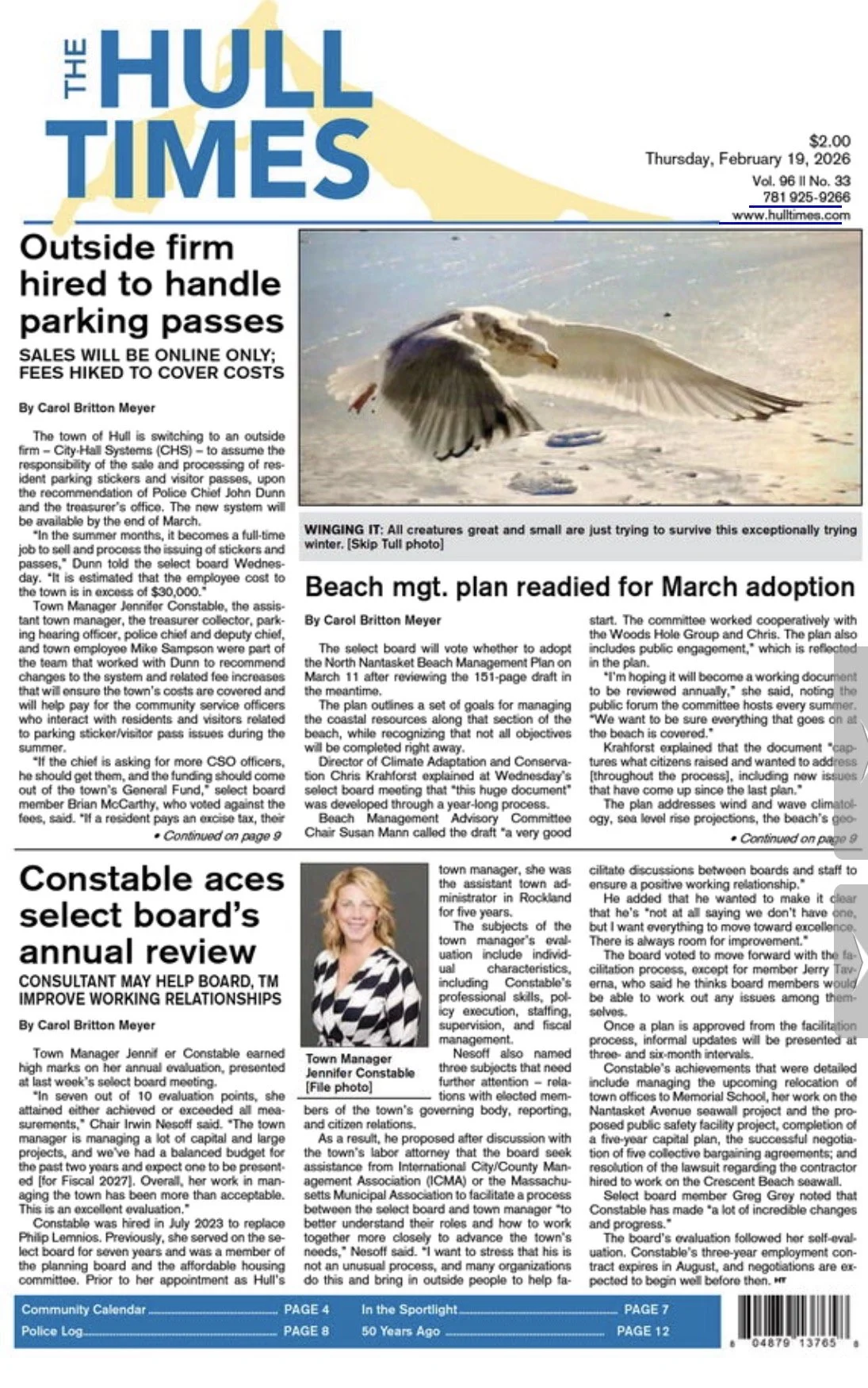A ‘yes’ vote at town meeting will increase local occupancy taxes…
/To the Editor:
Vote “yes” on Articles 39, 40, 41 and 42 at the annual town meeting.
I filed a citizens’ petition to call for an increase to the local occupancy excise tax from the current 4% to 6% under M.G.L., Chapter 64G, paragraph 3A. The maximum local rate is 6% (6.5% in Boston). The petition also calls for the 3% community impact fees under M.G.L., Chapter 64G, paragraph 3D. The local room occupancy excise tax and community impact fee applies to hotels, motels, bed-and-breakfasts, and short-term rentals.
The current 4% for local room occupancy excise tax was adopted in 1989. Legislation raised the rate to 6% on July 1, 2009, which the town did not adopt, resulting in lost revenues, which affected economic development in our town.
Since the Town of Hull adopted the local room occupancy excise tax in 1989 under M.G.L., Chapter 64G, paragraph 3A, it may and should adopt the local option community impact fee of up to 3% of rent regarding transfer of occupancies of two categories of short-term rentals described under paragraph 3D. A short-term rental is defined as a unit rented for 31 days or fewer.
The first local option community impact fee is adopted under M.G.L., Chapter 64G, paragraph 3D and applies to each transfer of occupancy of a “professionally managed unit,” which is defined as one of two or more short-term rental units in the same city/town not located within a single- or two- or three-family dwelling that includes the operators (owner’s) primary residence.
Under the second local option community impact fee (M.G.L., Chapter 64G, paragraph 3D(b), if the city/town has voted to adopt the local option community impact fee described above for “professionally managed units” under G.L. c. 64G, para. 3D(a), (an operator that owns multiple lodging establishments), may by a separate additional vote, adopt the local community impact fee on a short-term rental units found within a two- or three-family dwelling that includes the operator’s primary residence under M.G.L., Chapter 64G, paragraph 3D(b).
If the town does not vote to adopt the local option community impact fee under M.G.L., Chapter 64G, paragraph 3D(a) (above), it cannot adopt the local option community impact fee under M.G.L., Chapter 64G, paragraph 3D(b).
The operator of the lodging establishments charges and collects from the occupant(s) the local community excise tax and the local community impact fees. It is the responsibility of the operator to send the collected tax to DOR and DOR distributes the local share to the town and city. The revenue from the local room occupancy excise tax is general revenue and may be appropriated by the town’s legislative body for any municipal purpose.
The revenue from the local option impact fee is partially restricted. Thirty-five percent of the impact fee must be dedicated to affordable housing or local infrastructure projects (M.G.L., Chapter 64G, paragraph 3D(c). As a result, 35% of the impact fee revenue must be accounted for as a “receipts reserved for appropriation” account for affordable housing or local infrastructure projects. The balance of the impact fee will be general fund revenue and appropriated for any municipal purpose. However, under M.G.L., Chapter 64G, paragraph 3D(3), the town may dedicate more than the required 35% up to 100%, of the impact fees to affordable housing or infrastructure projects.
Properties rented for 14 days or fewer in a calendar year are exempt from state tax, local community excise tax, and impact fee.
The residents of the town do not pay the excise tax and impact fee. The visitors and tourists are charged, and the fees are collected by the operators of the lodging establishments and short-term rentals. The town and residents will benefit from the revenues for economic development. There will be less reliance on the town’s real estate taxes to pay for infrastructure and improvements to attract tourists and visitors. Up to 100% of the community impact fee can be reserve toward creating affordable housing.
Tourism in Massachusetts is a billion-dollar industry. It drives economic growth in Massachusetts. The Office of Travel and Tourism released a statement on October 30, 2024 stating that travel and tourism industry grew 5.3% to $23.6 billion in spending from domestic and international travelers, generating $2.3 billion in taxes for municipalities and the state and supporting 154,330 jobs. Plymouth County generated local and state taxes totaling $78.2 million. As of April 2025, 227 of 352 municipalities have adopted the local community excise tax. More than 80% of those municipalities adopted the 6% rate. Thirty-seven municipalities adopted the community impact fee.
There are more than 100 properties – i.e., hotels, motels, B&Bs, and short-term rentals that registered in this town. There are also many B&Bs and short-term rentals that are unregistered and are operating illegally, which call for enforcement by the town.
I believe that by not increasing the local community excise tax from 4% to 6% and adopting the 3% impact fee, the town is losing out on thousands of dollars of much needed revenues annually.
Sincerely,
Christopher Sweeney
Like what you’re reading? Stay informed and support our work with a Hull Times subscription by clicking here.
Do you have an opinion to share? Click here to write a Letter to the Editor.
© 2025 The Hull Times. All rights reserved.









